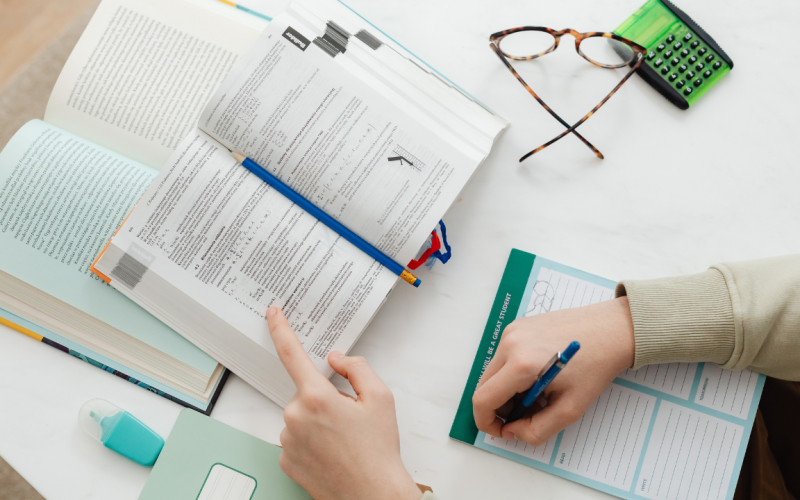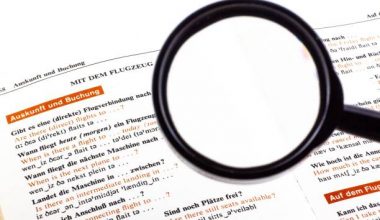Already feeling that mix of excitement and then just maybe, a smidge of panic – some exam nervousness? That’s totally normal! Everyone actually stresses about exams, but the great news is that if you have a solid revision plan or technique in place, then you can ace it. So, the question is, when should you start revising for your GCSEs?
Generally, each exam is like a challenge you need to overcome, but when you take some time to start preparing for it, you can make a big difference.
Now, this article discusses when you can start preparing for your GCSE revisions and how.
Table of contents
- Why you should revise for your GCSE
- Understanding the Importance of GCSEs
- When Should You Start Revising For Your GCSEs?
- When is it too late to start revising for GCSEs ?
- Does The Amount of Revision You Do Really Affect Your Results?
- How can I make sure I revise early enough?
- How Much Revision Should You Do For Your Exams?
- Techniques for Active Revision to Speed the Process
- FAQs GCSE Revision
- Conclusion
- References
- Recommendations
Why you should revise for your GCSE
Most people usually feel a bit “meh” about studying especially when an exam is looming large. Well, revisions actually help. They are not just about getting good grades but about giving yourself the best shot at succeeding in these important exams such as GCSE.
Succeeding in your GCSEs automatically opens up doors to more opportunities like courses and career paths. However, without some preps, these opportunities might seem impossible or too challenging. So, you see how revisions play an important role here?
Revision is like giving your brain a supercharge for the forthcoming exam. It helps you to remember the key information you need for your exam, and to feel confident on the day of your exam as well as on the result day. And it also helps you avoid those last-minute panics before and during the exams.
Read Also: Why Many Fail GCSE Exams
Understanding the Importance of GCSEs
Before we discuss the ideal time to start revising, let’s understand why GCSEs are so important. Your General Certificate of Secondary Education (GCSE) results can impact your future career options and educational pursuits.
These qualifications are widely recognized by employers and universities, making them a critical aspect of your academic journey.
Crafting Your GCSE Revision Plan
Creating a well-structured study schedule is crucial to make the most of your revision time. Here’s how you can do it:
- Set Clear Goals: Define what you want to achieve in each subject.
- Prioritize Subjects: Identify and allocate more time to the most challenging subjects.
- Time Management: Create a daily or weekly timetable to ensure you cover all subjects.
- Regular Breaks: Remember to schedule short breaks to recharge your mind.
- Variety in Study Methods: Use various techniques, including reading, practicing past papers, and flashcards.
Also, see: 15 A-Level & GCSEs Revision Techniques (That Actually Work)
When Should You Start Revising For Your GCSEs?
The time to start revising is when you have finished your exams. This is because if you wait until after the exam, there will be no need to revise any topics, so it will be harder to do so effectively.
It’s also important that you start revising for your GCSEs. It can often feel like an uphill battle to tackle all these new topics, especially if they take work for most people (like me).
However, if a month or two goes by without having spent any significant amount of time on self-study or revision, then it could lead you into a difficult situation where all those hard lessons learned over several years may not stick as well as they should – meaning that some areas might get missed out altogether!
Also, read: How Long Should You Revise For Your Exam? Student’s Guide
When is it too late to start revising for GCSEs?
The question of when it is too late to start revising for GCSEs is a common concern among students and parents alike.
While there is no one-size-fits-all answer, it is important to remember that starting early can provide a significant advantage. However, it’s never too late to begin the revision process.
Firstly, starting early allows for a steady and consistent approach, spreading the workload over an extended period.
By beginning revision well in advance, students have the opportunity to understand each topic and address any gaps in knowledge thoroughly. This not only ensures better retention of information but also reduces stress levels closer to exam time.
That said, even if you are behind on your revision schedule or have procrastinated until the last minute, all hope is not lost.
When time is limited, it’s important to focus on quality rather than quantity. Prioritize key topics and concentrate on understanding them thoroughly rather than trying to cover everything superficially.
Also, read: How To Revise For GCSE English Literature: The Ultimate Guide
Does The Amount of Revision You Do Really Affect Your Results?
When it comes to studying for exams or working on a project, the idea of revision is often emphasized. Many students and professionals believe that the more time they spend revising their work, the better their results will be. However, recent studies suggest that there may be a point of diminishing returns when it comes to revision.
Research shows that excessively revising material can hinder learning and retention. Constantly reviewing the same information without allowing time for reflection and consolidation can lead to cognitive overload and decreased motivation.
Active retrieval of information through practice questions or discussions may be more beneficial than simply rereading notes or textbooks multiple times.
Moreover, evidence suggests that focusing too much on revision alone may prevent individuals from engaging in other valuable learning strategies.
By dedicating all their time to repeatedly reviewing the material, individuals miss opportunities to apply what they have learned in new contexts or engage in deep thinking about concepts.
Therefore, balancing revision and active learning activities such as problem-solving exercises or group discussions seems to be key for optimizing results.
Read Also: Are GCSEs (Actually) Hard? Top Tips for Passing the Most Difficult GCSE Exam Papers
How can I make sure I revise early enough?
If you’re revising for your GCSEs, you’ll want to ensure you have enough time. This may seem obvious, but sometimes it’s easy to forget that the work we do in school needs time and effort. The best way of ensuring this is by having a good revision plan and timetable.
Revising for your GCSEs should be something other than an all-or-nothing experience: if things need improving, revise them! You should aim for 100% accuracy as much as possible–but don’t let perfection get in the way of getting good grades.
How Much Revision Should You Do For Your Exams?
The amount of revision needed for exams can vary depending on several factors, such as the difficulty level of the subject, your familiarity with the content, and your study habits. However, it is generally recommended to start revising well in advance to allow for a thorough understanding and retention of the material.
A good starting point is to create a study schedule that allocates specific time slots for each subject or topic. This will help you stay organized and cover all the necessary material.
It’s important to balance reviewing previous and learning new topics, as this will reinforce your understanding while expanding your knowledge base.
Additionally, practice questions and past papers can be invaluable tools in preparing for exams. These resources allow you to assess your understanding of the content and familiarize yourself with the exam format.
You can maximize your chances of exam success by dedicating sufficient time to revision, setting clear goals, and utilizing effective study techniques.
Read Also: How Long Is Study Leave For GCSE?
How much time do I have to complete my revision?
There are a few factors to consider when planning your revision schedule.
The first is the time you have left before your exams, which can vary depending on whether you’re taking both GCSEs simultaneously or just one exam (for example, if it’s an extended summer break).
How well-prepared do you feel? If there’s anything that’s making things difficult for you right now—like a family member who isn’t coping well with the stress of exams or finding yourself in an abusive relationship—it might be best to take care of those issues before tackling revising.
Read Also: What is the American Equivalent for GCSE and A level?
Do I need to be on a timetable when I’m revising?
Setting one is best if you are studying for your GCSEs and want to revise on a timetable. You should be able to work at your own pace and in small chunks, meaning you can get through more content in less time if you have planned ahead of time.
Suppose this is impossible for whatever reason (for example, illness or school holidays). In that case, some part of your revision period must happen during peak hours when other people will revise.
You should start revising early, but take your time with it.
You must be prepared for the exam and willing to give it your best. If you are not ready, then there is no point in doing any revision at all.
Can’t You Revise For The Subjects You’re Not Good At To Save Time?
While focusing on subjects you’re not good at to save time sounds appealing, it may not always be the most effective strategy. Revising these challenging topics without addressing your weaknesses may result in minimal improvement and wasted effort.
Instead, consider adopting a more holistic approach that emphasizes personalized learning techniques. By identifying your specific areas of weakness and tailoring your study methods accordingly, you can optimize your revision process and achieve better outcomes.
Furthermore, solely revising subjects you struggle with could lead to frustration and demotivation. Spending excessive time on particularly difficult topics might make studying feel like an uphill battle. It is essential to strike a balance between strengthening weaker areas while also reinforcing your strengths.
This approach will help maintain motivation and enjoyment in the learning process. Remember that understanding each subject can foster a deeper appreciation for knowledge, allowing you to draw connections between disciplines and develop a more well-rounded perspective in your academic journey.
Also, read: When Do You Pick Your GCSEs in Year 9?
Techniques for Active Revision to Speed the Process
Techniques for active revision require doing something with the content rather than just passively reading it. The following are some instances of active revision strategies:
Flashcards
These are useful techniques for memorizing important information, such as dates or formulas. Use real flashcards or digital flashcard software to create flashcards that have a question or key concept on one side and the solution on the other. See How To Make Effective Flashcards That Actually Work as a Student
Mentoring others
You will gain a deeper knowledge of the topic when you have to explain it to someone, whether a friend, family member, or even a pet.
Spacing out repetition
Using this method, you go through the content more frequently over time. Regularly going over the content will keep it fresh in your mind and eliminate the need for last-minute cramming.
Self-testing
By making a quiz or a set of questions, you can assess your knowledge of the subject. You can accomplish this on your own or using various online tools, and you’ll be able to see where you need extra training or clarification.
Read Also: When Do You Do Your GCSEs? Everything You Need to Know
FAQs GCSE Revision
Not at all. Starting in Year 9 is an excellent strategy to ensure you have enough time to master your subjects gradually.
While it could be better, six months is reasonable, especially if you stay consistent and focused.
It varies from person to person, but aim for at least 1-2 hours per subject daily.
While dedication is commendable, avoid burnout by maintaining a balanced approach to revision.
It’s always possible to start but be prepared for intensive, focused revision to catch up.
Conclusion
In conclusion, the question, “When should you start revising for your GCSEs?” has a straightforward answer: as early as possible. Early preparation provides numerous benefits, including comprehensive subject coverage, reduced stress, and flexibility in your study schedule. Remember to create a well-structured revision plan and stay motivated throughout the process.
So, don’t wait; start your GCSE revision journey today and pave the way for academic success!
References
- Edumentors.co.uk – When Should You Start Revising For Your GCSEs?
- Tutordoctor.co.uk – Guide to GCSE revision
- https://twinklsecondary.blog – When Should You Start Revising For Your GCSEs?
- Thinkstudent.co.uk – Best time to start revising for GCSEs






